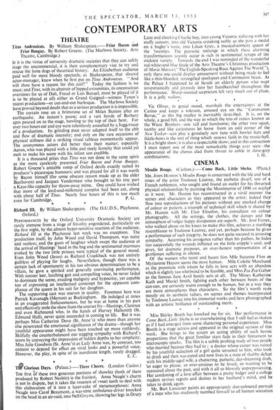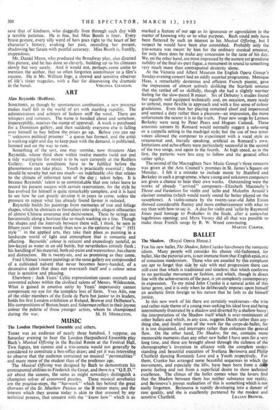CINEMA
Ma. JOHN HUSTON'S Moulin Rouge is concerned with the life and hard times of the artist Toulouse Lautrec, the pathetic dwarf, son of a French nobleman, who sought and found an outlet for his thwarted physical relationships by painting the Montmartre of 1890 en negligi as it were. Mr. Huston has reconstructed in a vivid manner the scenes and characters as they appeared to the artist; indeed they flow into reproductions of his pictures without any marked change of colour or pattern, a triumph of technical skill which is shared by Mr. Huston with Mr. Eliot Elisofon, his consultant on colour photography. All the settings, the clothes, the dances and the atmosphere of vulgar happy dissipation are superb. Mr. Jose Ferrer, who walked about on his knees to make this film, achieves a startling resemblance to Toulouse Lautrec, and yet, perhaps because he gives a performance of such integrity, he does not quite succeed in arousing sympathy. Accenting his arrogance rather than his pathos, he hides too successfully the wounds inflicted on the little cripple's soul, and gives, for dramatic purposes, an over-honest representation of a gentleman suffering in silence. Of the women who taunt and haunt him Mlle Suzanne Flon as Myrianune Hayem seems the most human. Mlle Colette Marchand as the prostitute with whom he falls in love acts with an abandon which is slightly too whirlwind to be feasible, and Miss Zsa Zsa Gabor as the famous Jane Avril barely acts at all. The Misses Katherine Kath and Muriel Smith, fighting each other between bouts of the can-can, are certainly warm enough to be human, but in a way they are More atmospheres than characters. So the film's worth rests mostly on its aesthetic values, on scenes and themes incorporated by Toulouse Lautrec into his immortal works and here photographed with an artistic brilliance of outstanding merit.
• • • Miss Shirley Booth has knocked me for six. Her performance in Come Back, Little Sheba is so overwhelming that I still feel as shaken as if I had emerged from some shattering personal experience. Miss Booth is a stage actress and appeared in the original version of this work. She brings to the screen an acting ability of such heroic proportions that the great familiar stars fade in their firmament to microscopic specks. The film is a subtle probing study of two people who married because they had to ; a doctor whose career was ruined by his youthful seduction of a girl quite unsuited to him, who took to drink and then was cured and now lives in a state of shabby defeat with his middle-aged wife, a chattering, pathetic, day-dreaming drab, eager to please, so over-anxious to be loved, so wanting -to be reassured about the past, and with it all so blowsily unprepossessing. Her condoning of a love affair between a pretty lodger and a college student revives regrets and desires in her husband's mind, and he takes to drink again. Mr. Burt Lancaster paints an appropriately dun-coloured portrait of a man who has studiously numbed himself to all human sensation save that of kindness, who doggedly lives through each day with a terrible patience. He is fine, but Miss Booth is finer. Every brave gesture, every silly word of hers goes right to the heart of her character's history, evoking her past, recording her present, shadowing her future with painful accuracy. Miss Booth is, frankly, stupendous.
Mr. Daniel Mann, who produced the Broadway play, also directed this picture, and he has done so cleverly, building up to his climaxes slowly but very surely. And it would not, perhaps, come amiss to mention the author, that so often forgotten contributor to a film's success. He is Mr. William Inge, a shrewd and sensitive observer of life's tinier tragedies, with a flair for discovering the dramatic



































 Previous page
Previous page